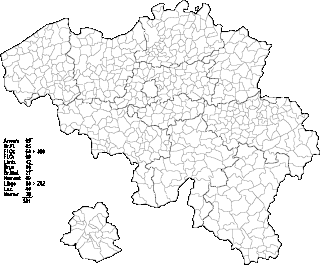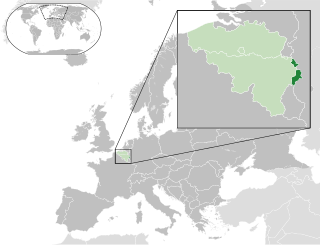
The politics of Belgium take place in the framework of a federal, representative democratic, constitutional monarchy. The King of the Belgians is the head of state, and the Prime Minister of Belgium is the head of government, in a multi-party system. Executive power is exercised by the government. Federal legislative power is vested in both the government and the two chambers of parliament, the Senate and the Chamber of Representatives. The federation is made up of (language-based) communities and (territorial) regions. Philippe is the seventh and current King of the Belgians, having ascended the throne on 21 July 2013.

The country of Belgium is divided into three regions. Two of these regions, the Flemish Region or Flanders, and Walloon Region, or Wallonia, are each subdivided into five provinces. The third region, the Brussels-Capital Region, is not divided into provinces, as it was originally only a small part of a province itself.

The European Green Party (EGP), sometimes referred to as European Greens, is the European political party that operates as a federation of political parties across Europe supporting green politics. The EGP cooperates with the European Free Alliance (EFA) to form the Greens–European Free Alliance (Greens/EFA) parliamentary group in the European parliament.
On 13 June 2004, regional elections were held in Belgium, to choose representatives in the regional councils of the Flemish Parliament, the Walloon Parliament, the Brussels Parliament and the German-speaking Community of Belgium. The elections were held on the same day as the European elections.

The Parliament of the Walloon Region, which brands itself as the Parliament of Wallonia and previously as the Walloon Parliament, is the legislative body of the Walloon Region (Wallonia), one of the three self-governing regions of Belgium. The parliament building, the former Hospice Saint-Gilles, is situated in Namur, the capital of Wallonia, at the symbolic confluence of the Meuse and the Sambre, the two main rivers of the most inhabited parts of Wallonia, the Sillon industriel. On the other side of the Meuse, facing the Parliament, is the Élysette, the seat of the Walloon government.

The Parliament of the Brussels-Capital Region, is the governing body of the Brussels-Capital Region, one of the three regions of Belgium. It is also known as the Brussels Regional Parliament.
Regional elections were held in Belgium, to choose representatives in the regional councils of Flanders, Wallonia, Brussels and the German-speaking Community on 13 June 1999. The regional elections were held on the same day as the European elections and the federal elections.

The Belgian Federal Parliament is the bicameral parliament of Belgium. It consists of the Chamber of Representatives and the Senate. It sits in the Palace of the Nation. The Chamber of Representatives is the primary legislative body; the Senate functions only as a meeting place of the federal communities and regions.

The Parliament of the German-speaking Community is the legislative assembly of the German-speaking Community of Belgium based in Eupen.

Elections in Belgium are organised for legislative bodies only, and not for executive functions. Direct elections take place for the European Parliament, the bicameral Federal Parliament, the Parliaments of the Communities and Regions, the provincial councils, the municipal councils and a few district councils. Voting is mandatory and all elections use proportional representation which in general requires coalition governments.

Malta elects on a national level 6 MEPs representing Malta in the European Parliament, on a district level the legislature, On a local level the Local Councils and on a community level the Administrative Committees.

The Grand Council is the parliament of the Swiss canton of Bern.

The Belgian provincial, municipal and district elections of 2000 took place on Sunday October 8, 2000. The electors elected the municipal councillors of 589 cities and towns as well as the ten provincial councils. Additionally, the newly established district councils in the city of Antwerp were elected for the first time.

General elections were held in Belgium on 10 March 1974. The Belgian Socialist Party emerged as the largest faction in the Chamber of Representatives with 59 of the 212 seats. Voter turnout was 90.3%. Elections were also held for the nine provincial councils, as well as for the Council of the German Cultural Community for the first time.
On May 21, 1995, regional elections were held in Belgium, to choose representatives in the regional councils of Flanders, Wallonia, Brussels and the German-speaking Community of Belgium. It also was the first time elections were held for the Flemish and the Walloon Council. The regional elections were held on the same day as the federal election.
Regional elections were held in Belgium on 7 June 2009 to choose representatives in the regional parliaments of Flanders, Wallonia, Brussels and the German-speaking Community of Belgium. These elections were held on the same day as the European elections.
A regional election was held in Belgium on 18 June 1989 to elect representatives to the first Brussels Regional Council, which replaced the Brussels Agglomeration Council as a result of the creation of the Brussels-Capital Region. Elections to the European Parliament were held on the same day.

The Tamil Nadu Legislative Assembly alone has powers to legislate laws covering state subjects in the Indian state of Tamil Nadu. It has a strength of 235 members of whom 234 are democratically elected using the First-past-the-post system. The remaining member is nominated as a representative of the Anglo-Indian community. The presiding officer of the Assembly is called the Speaker. The term of the Assembly is five years unless it is dissolved earlier.
On 26 October 1986, regional elections were held in the German-speaking Community of Belgium, to choose representatives for the Council of the German-speaking Community. They were the first elections to the Council after the German Cultural Community was changed into the German-speaking Community, with more autonomy, an own executive body, and elections that were held separately from the national legislative elections.














